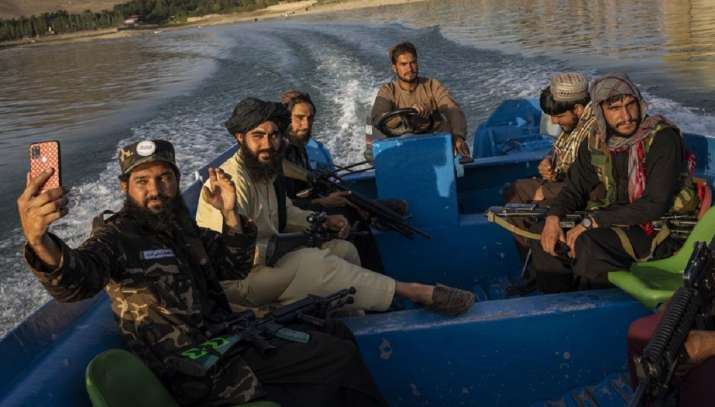
Taliban fighters enjoy a boat ride to the loom dam on the outskirts of Kabul, Afghanistan
A recent European Parliament resolution highlighting Islamabad’s role in Afghanistan comes against the backdrop of growing global recognition that despite the Taliban showing their true colours, it is no less than a surprise that Pakistan is still Selling the world, that organization has, according to experts, overtaken control of the war-torn country. According to experts from the European Foundation for South Asian Studies (EFSAS), Pakistan’s interest in the Taliban is not hidden from the world.
Pakistan Prime Minister Imran Khan reiterated his county’s stance of giving global recognition to the Taliban in a recent interview.
There have been reports of senior Taliban leaders insisting on beheading and brief executions. During the previous Taliban regime (1996 to 2001), when the then Foreign Minister of Afghanistan, Mullah Nooruddin Turabi, had announced the beheading of Afghans, Pakistani Foreign Minister Shah Mahmood Qureshi advocated in the United Nations General Assembly (UNGA) that The international community develops a road map that leads to diplomatic recognition of the organization.
Meanwhile, China has called for the release of frozen Afghan funds to the Taliban, partly because of its own greedy eyes on Afghanistan’s assets, but equally at the insistence of Pakistan.
Against the backdrop of Pakistan being so deeply invested in fundamentalist ideology, it is no surprise that fears of Pakistani nuclear weapons finding their way into the hands of radical Islamists have been significantly raised last week, says the EFSAS think tank. Got stressed.
These factors have been debated by experts including US National Security Advisor (NSA) John R. Bolton and Italian author and journalist Francesca Marino.
In his Washington Post article ‘The time is over to talk about a nuclear-armed, Taliban-friendly Pakistan’, Bolton described Pakistan as “a single government made up of arsonists and firefighters”.
The article underlined that Pakistan’s support for Islamist terrorism and its “reckless” pursuit of nuclear weapons had “neglected or balanced” the time.
He described the Inter-Services Intelligence (ISI) as a long-standing “center of radicalization”, which has spread to higher and higher ranks throughout the military.
Prime Minister Imran Khan, like many former elected leaders, is essentially just another pretty face”.
He also said that “when the US coalition overthrew the Taliban in 2001, the ISI provided sanctuary, weapons and supplies inside Pakistan”, and that “Pakistan has thwarted terrorist groups targeting India, its main regional rival on Kashmir. also enabled”.
Taking the argument further, Marino, who specializes in South Asia, said in her article on 15 September that Pakistan’s nuclear buttons were “already in the hands of a terrorist organization”.
He further highlighted Islamabad’s role in making Afghanistan a major hive of terrorism, saying the magnitude of the problem has reached such a height that the West can no longer ignore it.
Indicating that Pakistan’s continued support for terrorism has made it a de facto terrorist state, it suggested that allowing the continuation of nuclear weapons in the hands of such a state could have consequences “that would be better than any war”. will be far worse”.
The Taliban has declared the Islamic Emirate of Afghanistan and has already begun to implement a number of repressive measures to reverse the achievements of the Afghan people of the past 20 years, which were supported and facilitated by the European Union and the international community .
A release from the European Parliament said Afghan women and girls, and ethnic, religious and other vulnerable groups, would suffer the most from the already ongoing repression of their basic rights.
The Taliban have taken power by force and the caretaker government they have appointed is neither inclusive, nor legitimate, nor accountable to the Afghan people.
The Taliban announced the caretaker government of the Islamic Emirate of Afghanistan, naming Mullah Mohammad Hassan Akhund as interim prime minister and Mullah Abdul Ghani Baradar, the group’s co-founder, as its deputy, which has no women in its cabinet. Was.
(with ANI inputs)
Read also | World leaders discuss Afghanistan at UN General Assembly
.